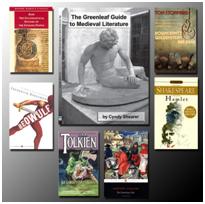 It is with great pride that Greenleaf Press announces the publication of the Greenleaf Guide to Medieval Literature ($19.95) by Cyndy Shearer
It is with great pride that Greenleaf Press announces the publication of the Greenleaf Guide to Medieval Literature ($19.95) by Cyndy Shearer
For over ten years, Cyndy has been teaching high school literature classes in home school tutorial settings. For the past five years, she has been teaching all four years of western literature at the Schaeffer Study Center, in Mt. Juliet. We are very pleased to be able to publish the second volume in her four year syllabus. The Greenleaf Guide to Medieval Literature joins the already published Greenleaf Guide to Ancient Literature
($18.95). The Greenleaf Guides for years three & four (Early Modern Lit and Modern Lit) are under development – meaning Cyndy is already teaching them and refining the material.
 Like the Greenleaf Guide to Ancient Literature, the Greenleaf Guide to Medieval Literature takes an inductive approach to the study of selected outstanding literary compositions. Rather than studying short excerpts from dozens of possible works, Cyndy has selected a representative set of selections for close study. Students are led by a series of questions that help them to read and understand the text, and then to reflect on the larger questions being dealt with and the authors’ worldviews. A high school student who completes these two literary studies will have a superior background and preparation for the study of modern literature – either in high school or college.
Like the Greenleaf Guide to Ancient Literature, the Greenleaf Guide to Medieval Literature takes an inductive approach to the study of selected outstanding literary compositions. Rather than studying short excerpts from dozens of possible works, Cyndy has selected a representative set of selections for close study. Students are led by a series of questions that help them to read and understand the text, and then to reflect on the larger questions being dealt with and the authors’ worldviews. A high school student who completes these two literary studies will have a superior background and preparation for the study of modern literature – either in high school or college.
Beginning with Bede and Anglo-Saxon poetry, the Guide (with wry observations by Cyndy) takes students through Beowulf, Gawain, Chaucer, & Hamlet. A worldview bonus is the conclusion of the course with a study of Rosencrantz and Guildenstern are Dead – Tom Stoppard’s raucous verbal pyrotechnics on the themes of fate and death which uses two of the minor characters from Hamlet who get caught up in Shakespeare’s play and then try to puzzle out what the intrigues of Denmark mean when all the Shakespearean characters have left the stage.
The text is designed for an instructor (parent, teacher, or tutor) and student who are reading the text together. Some students may be able to complete this study on their own, but the best experiences will be the discussion of themes and issues with another reader. You don’t have to be an expert in medieval lit in order to teach this course – you just have to be willing to do the reading along with your student(s).
Cyndy is eminently well qualified to teach and write on these themes. She is a summa cum laude graduate of Queens College (she graduated in three years and wrote an undergraduate honors thesis on the poetry of T.S.Eliot). She has an MA in English from the University of Virginia, with an emphasis in contemporary American and European poetry. At U.Va. she participated in the graduate poetry writing workshop led by the gifted poet, Gregory Orr. Cyndy has been homeschooling the Shearer children since 1985, having graduated five from high school – and with six more still at home. She co-founded the Francis Schaeffer Study Center in Mt. Juliet with her husband Rob in 2003.
Along with the Greenleaf Guide to Medieval Literature, Greenleaf Press is pleased to make available a complete study package which includes the Guide and all six of the texts selected by Cyndy for her course on Medieval Literature. The texts include:
 The Ecclesiastical History of the English People, by the Venerable Bede
The Ecclesiastical History of the English People, by the Venerable Bede
Beowulf, trans. Rebsamen
Gawain, trans. Tolkien
Canterbury Tales, by Geoffrey Chaucer
Hamlet, by William Shakespeare
Rosencrantz and Guildenstern are Dead, by Tom Stoppard
The Greenleaf Guide to Medieval Literature, by Cyndy Shearer
The Medieval Lit Study Package is available for $70.91 (regular retail – $78.70)
 Also available from Greenleaf Press is the Ancient Lit Study Package which contains:
Also available from Greenleaf Press is the Ancient Lit Study Package which contains:
The Greenleaf Guide to Ancient Literature ($18.95)
The Epic of Gilgamesh (Sandars translation)
The Odyssey (Robert Fitzgerald translation)
The Oedipus Cycle (Robert Fitzgerald translation)
Antigone by Anouilh (Barbara Bray translation)
The Ancient Lit Study Package
is available for $61.08 (regular retail – $67.85)
Both the Greenleaf Guide to Ancient Literature and the Greenleaf Guide to Medieval Literature are also available as downloadable eBooks, making it easy for a parent/teacher/tutor to provide the text to their student, while using the eBook to follow along on their computer.
Needless to say, I highly recommend these high school literature courses for homeschoolers, classical schools, and any high school program that wants a thoughtful rich study of the history of Western Literature.
- Rob Shearer
Director, Schaeffer Study Center
Publisher, Greenleaf Press
